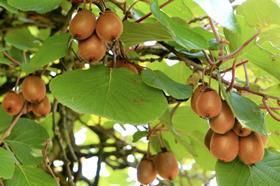
The Whanganui region of New Zealand may become a significant kiwifruit growing region after news emerged a leading kiwifruit processor has plans to convert up to 150ha of farmland near the city into kiwifruit orchards.
NZ Herald reports kiwifruit industry grower and post-harvest operator, Apata Group, is looking to buy land from existing landowners to convert the area into new orchards. It’s a move expected to add around 1.5m additional kiwifruit trays for export every year.
Apata brand and communications manager Dave Freeman said the company is interested in purchasing from farmers who may be looking to free up capital or who are keen to consider options for diversifying the use of their land.
'Kiwifruit grows well in that area,' said Freeman. 'We already have several orchards in the region, the largest of which is a 21ha block we bought from a dairy farmer recently and we are now looking for more suitable land.'
Apata handles around 10 per cent of New Zealand's kiwifruit exports – an amount equivalent to 15m trays annually, according to NZ Herald.
It harvests and processes the fruit through its pack house and cool storage facilities in Te Puke and Katikati in the Bay of Plenty, all of which is then supplied to Zespri for export.
Freeman said once land has been purchased, Apata will form syndicates to own the orchards, develop them then grow, process and supply the kiwifruit to Zespri for sale on behalf of the landowners.
He explained some farmers may want to simply sell off parcels of land, others may wish to remain a partner in one of the orchard developments while there is also the option for landowners to diversify their revenue streams and develop kiwifruit on their land – something Apata can facilitate for them.
'We're flexible and happy to work with landowners on the option that works best for them,' he told NZ Herald. 'Each option should produce a good outcome for the farmers as they will either sell land at a good value or, as an owner or part-owner of an orchard, realise a better return on investment once the orchard is producing than grazing, dairy, cropping or other uses do.
'Apata is primarily a processor, our plant utilisation will improve as a result, so it is a win-win,' he added.



